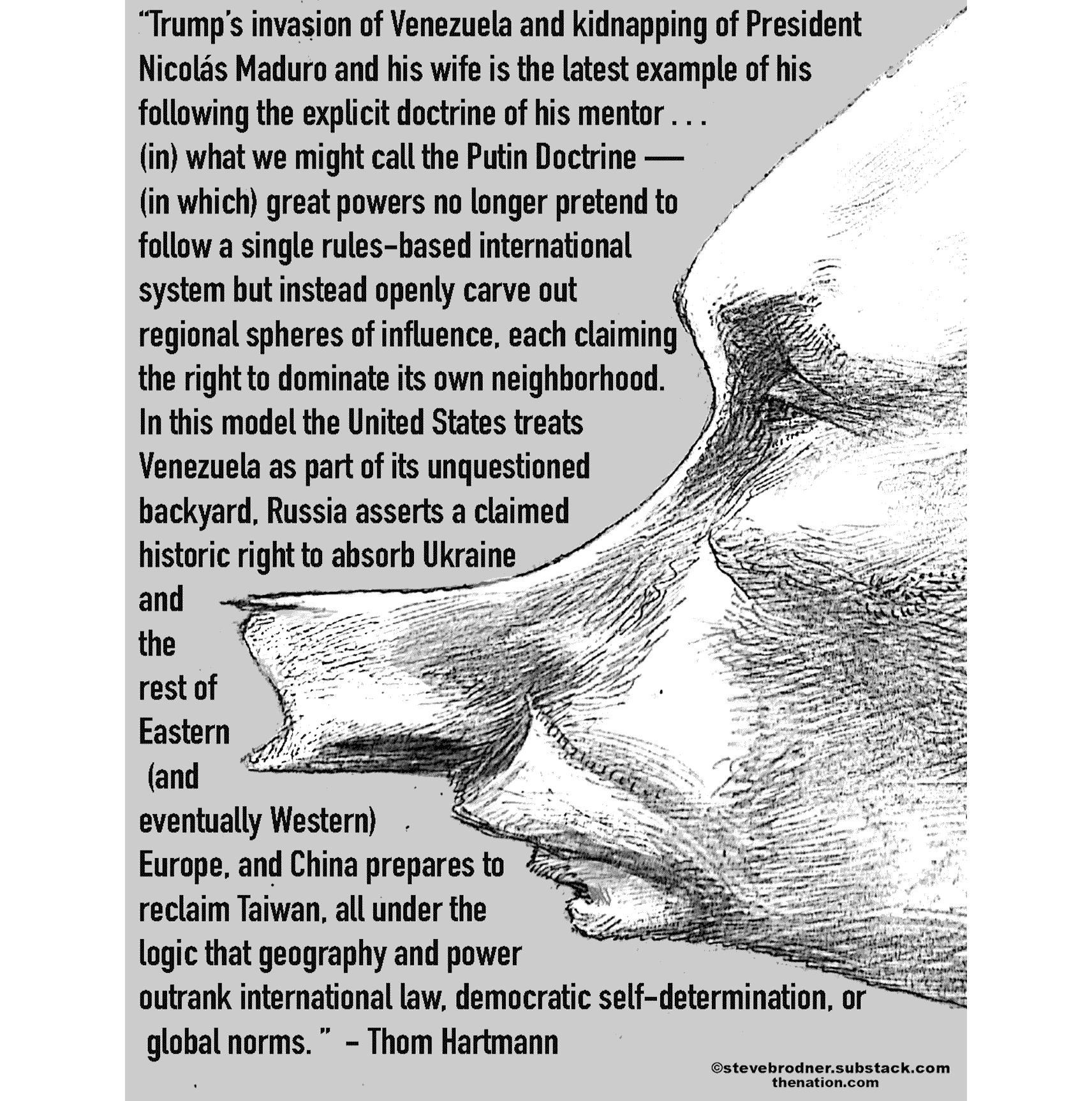The Biggest Threat to Donald Trump Could Be the Constitution Itself
Whether he is convicted or not, legal scholars and historians argue that Trump’s insurrectionist actions meet the disqualification standard outlined in the 14th Amendment.
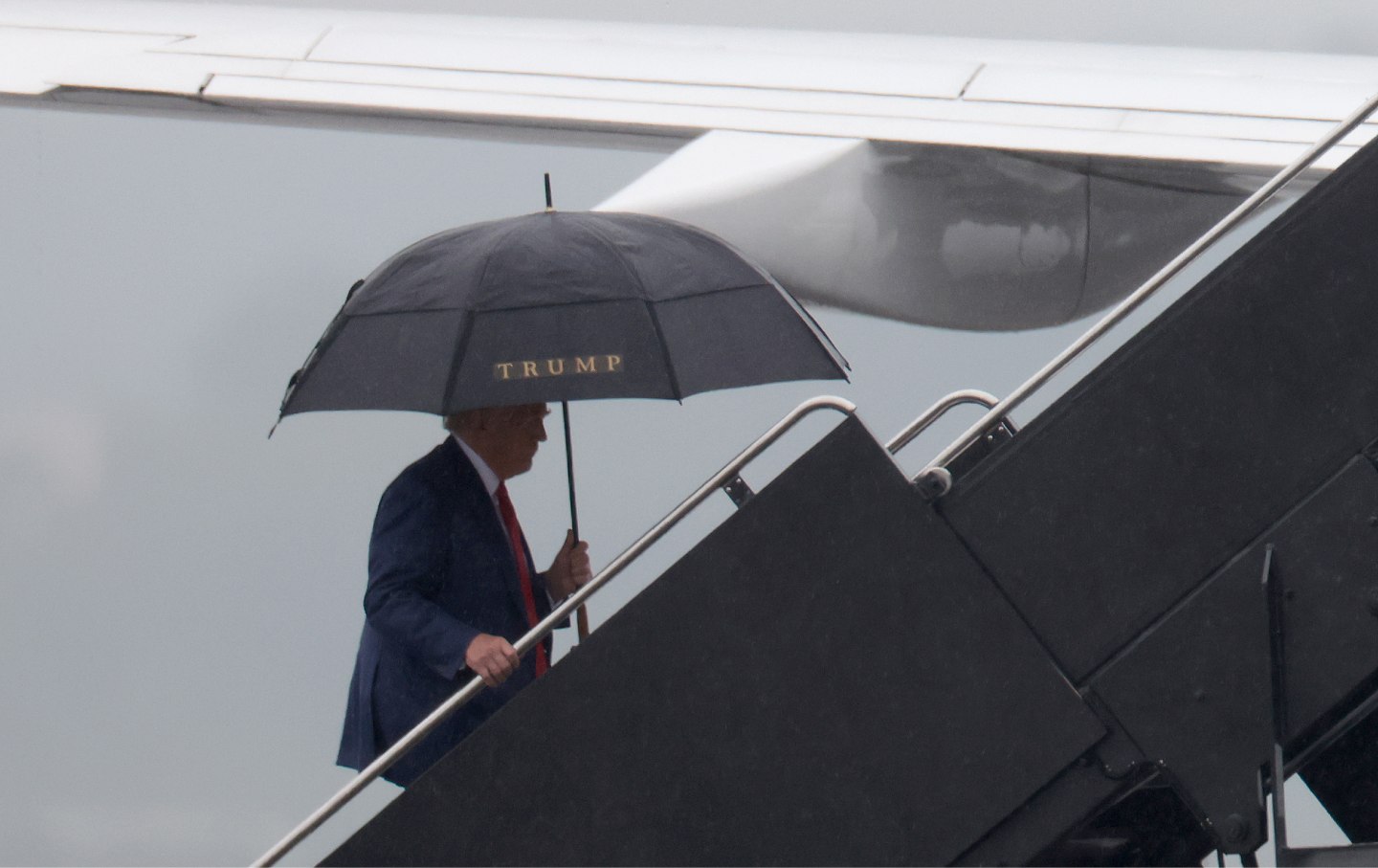
Donald Trump boards his plane at Reagan National Airport following an arraignment in a Washington, D.C., federal court on August 3, 2023.
(Win McNamee / Getty Images)Donald Trump, the first former president ever charged with a criminal offense, currently faces 78 felony counts from three separate indictments. And that total could easily rise as Trump continues his 2024 presidential campaign. There is even a chance—though not a very good one—that Trump could be convicted before Election Day, creating the much-discussed prospect of a jailhouse candidacy.
Yet the former president’s legal troubles are not, for the most part, a barrier to his political ambitions. Trump’s the clear front-runner for the Republican nomination and a serious contender against Democratic President Joe Biden in polls about the general election. Indicted and incarcerated candidates have bid for the presidency before, and Trump’s supporters appear to relish the prospect of an outlaw candidacy in 2024—just as Trump, who is using campaign funds to cover his mounting legal bills, relishes the prospect that his enthusiastic backers will continue to pad his accounts with donations.
But there is one point at which Trump’s legal and political trajectories could intersect to the detriment of his bid. If he is convicted on the charges that Justice Department special counsel Jack Smith brought this week in connection with Trump’s efforts to overturn the results of the 2020 presidential election—as part of what US Representative Bennie Thompson, the Mississippi Democrat who chaired the bipartisan House Select Committee to Investigate the January 6th Attack on the United States Capitol, identified as “an attempted coup attempt, a brazen attempt, as one rioter put it shortly after January 6th, to overthrow the government”—the campaign will face new perils.
The US Constitution has very clear language about the consequences for people who try to overthrow the government. Here’s what Section Three of the 14th Amendment says regarding such crimes:
No person shall be a Senator or Representative in Congress, or elector of President and Vice-President, or hold any office, civil or military, under the United States, or under any State, who, having previously taken an oath, as a member of Congress, or as an officer of the United States, or as a member of any State legislature, or as an executive or judicial officer of any State, to support the Constitution of the United States, shall have engaged in insurrection or rebellion against the same, or given aid or comfort to the enemies thereof. But Congress may by a vote of two-thirds of each House, remove such disability.
Since Smith brought his charges on Tuesday, there have been tortured attempts to suggest that because the indictment did not explicitly embrace the January 6 committee’s recommendation that Trump be charged with violating 18 U.S.C. Section 2383—which makes it a crime to incite, assist or engage in a rebellion or insurrection—a conviction of the former president would not meet the standards for his disqualification under the 14th Amendment. Even more tortured have been the arguments suggesting that because the 14th Amendment does not specifically define the elements of insurrection or who might reasonably be understood as “an officer of the United States,” it doesn’t necessarily apply to a convicted Donald Trump.
These are absurd calculations. The common understanding of an insurrection, as explained in both dictionary definitions and legal discussions, is an action taken against the government in order to displace a legitimate leader and replace that leader with an illegitimate pretender to power. That is precisely what Trump and his allies attempted to do in 2020 after he lost the popular vote by 7 million ballots and was defeated by a 306-232 margin in the Electoral College. Smith’s charges address actions that sought to upend the peaceful transition of power and install an illegitimate president. If Trump is convicted, it’s entirely reasonable to argue that the 14th Amendment standard has been met.
The idea that the 14th Amendment doesn’t apply to Trump’s specific circumstance is an even more absurd fantasy. An amendment that disqualifies lawless members of Congress, legislators, judges, and executives can reasonably be understood to include lawless presidents—especially given the fact that the president, as the head of the executive branch, is the most powerful “executive officer” in the country. To suggest otherwise is to make a mockery of a Constitution that is framed around the basic premise that the president is not a divinely empowered monarch.
The 14th Amendment was added to the Constitution after the Civil War, in recognition of the fact that former supporters of the Confederate rebellion against the legitimate government of the United States might attempt to regain power in the post-war U.S. Does anyone seriously believe that the 14th Amendment would not have applied to a former president who threw in with the revolt by states that wanted to continue to enslave human beings — as did John Tyler, the 10th president who literally helped to establish the Confederacy and briefly served in the Confederate House of Representatives—had such a figure sought federal office? Such a scenario would be almost as incomprehensible as the idea that Jefferson Davis, the former U.S, Senator and U.S. Secretary of War who served as president of the Confederate States of America (and who, unlike Tyler, lived until a quarter-century after the collapse of the Confederacy) might ever have been considered to be exempt from the sanctions outlined in the 14th Amendment.
Yet, in recent days media outlets have ponderously suggested that it’s “unlikely” that the 14th would apply to Trump—even if he is convicted for engaging in felonious attempts to overthrow the government. And the 117th Congress, which could have enacted legislation stating that Trump had violated the 14th Amendment when Democrats were in charge of both the US House and the US Senate, failed to do so.
Why is there so much caution with regard to the 14th Amendment? Why are so many elected officials, jurists, and commentators so inclined toward ridiculously narrow interpretations of its intent and its applicability? This is about more than just Trump. Despite the frequent recitations of the line “no man is above the law,” people in positions of power generally accept the notion of what Arthur Schlesinger Jr. referred to as an “imperial presidency“—with all the trappings of office, and all the privileges, of royalty. At their best, they generally think of the president as “a king for four years.” At their worst, they imagine that former presidents leave the White House wearing cloaks of invulnerability.
But honest interpreters of the Constitution recognize the language of the 14th Amendment for what it says, as well as the historical context in which it was written. Pulitzer Prize–winning historian Eric Foner argued immediately after January 6 that Congress could, with a simple majority, invoke the 14th Amendment and disqualify Trump. US Representative Jamie Raskin, the Maryland Democrat and former constitutional law professor who led the effort to convict Trump following the former president’s 2021 impeachment, has said with regard to the 14th Amendment’s standard for disqualification, that Trump “really does fulfill exactly the constitutional prohibition there.”
The watchdog group Citizens for Responsibility and Ethics in Washington (CREW) explained in a comprehensive report issued earlier this summer that because “Trump caused a violent insurrection that nearly overthrew an election and shattered our democracy,” he “disqualified himself under Section 3 of the Fourteenth Amendment from holding any federal or state office, including the presidency.” Indeed, declared CREW, “Donald Trump is the living embodiment of the threat that the Fourteenth Amendment’s framers sought to protect American democracy against when they barred constitutional oath-breakers from office.”
There are, of course, Trump allies who disagree with this interpretation of the former president’s actions following the 2020 election. The value of Jack Smith’s prosecution is that it will bring clarity to the debate. If Trump is convicted, it will empower those who have long advocated for holding him to account.
Popular
“swipe left below to view more authors”Swipe →The problem is that the prosecution of Trump will not move as quickly as the electoral process. So we face the prospect that Trump will campaign as an indicted rather than a convicted contender.
Do we just have to wait? Do we have to accept the prospect—no matter how remote—that Trump’s lawyers might delay the process for so long that he could be elected president in 2024, appoint a new attorney general, and shut down the prosecution? Not necessarily, says John Bonifaz, a constitutional lawyer who founded the National Voting Rights Institute and now serves as president of Free Speech for People, a national group with a long history of working on presidential accountability issues. He argues that election officials do not need to wait for a conviction.
“Secretaries of state and chief election officials across the country will have to decide whether or not Donald Trump is eligible to appear on their state ballots for the 2024 Republican presidential primary elections before any conviction can reasonably be achieved in this case,” says Bonifaz. “But it is clear from the historical precedent, legislative history, and text of Section 3 of the Fourteenth Amendment that no criminal conviction whatsoever is necessary to enforce that critical constitutional provision. The vast majority of ex-Confederates disqualified under the Insurrectionist Disqualification Clause were never charged with the crime of participating in that rebellion. The evidence is overwhelming that Trump incited, mobilized, and facilitated the January 6th insurrection.”
Free Speech For People and Mi Familia Vota Education Fund sent letters in July to secretaries of state and chief election officials in nine states, urging them to abide by the US Constitution and bar former president Donald Trump from 2024 ballots.
The letters explained that “the qualifications for eligibility for the presidency—in addition to natural-born citizenship, age, and residency—have also included not having engaged in insurrection against the United States after having taken an oath to support the Constitution. And Trump does not meet that qualification.”
The conviction of Trump for seeking to overturn the results of an election he lost is not the fundamental issue regarding his access to the presidency. Whether he is convicted or not, says Bonifaz, “Secretaries of state and chief election officials must carry out their duty, follow the mandate of Section 3 of the 14th Amendment, and bar Trump from the ballot. He is the Jefferson Davis of our time.”
More from The Nation
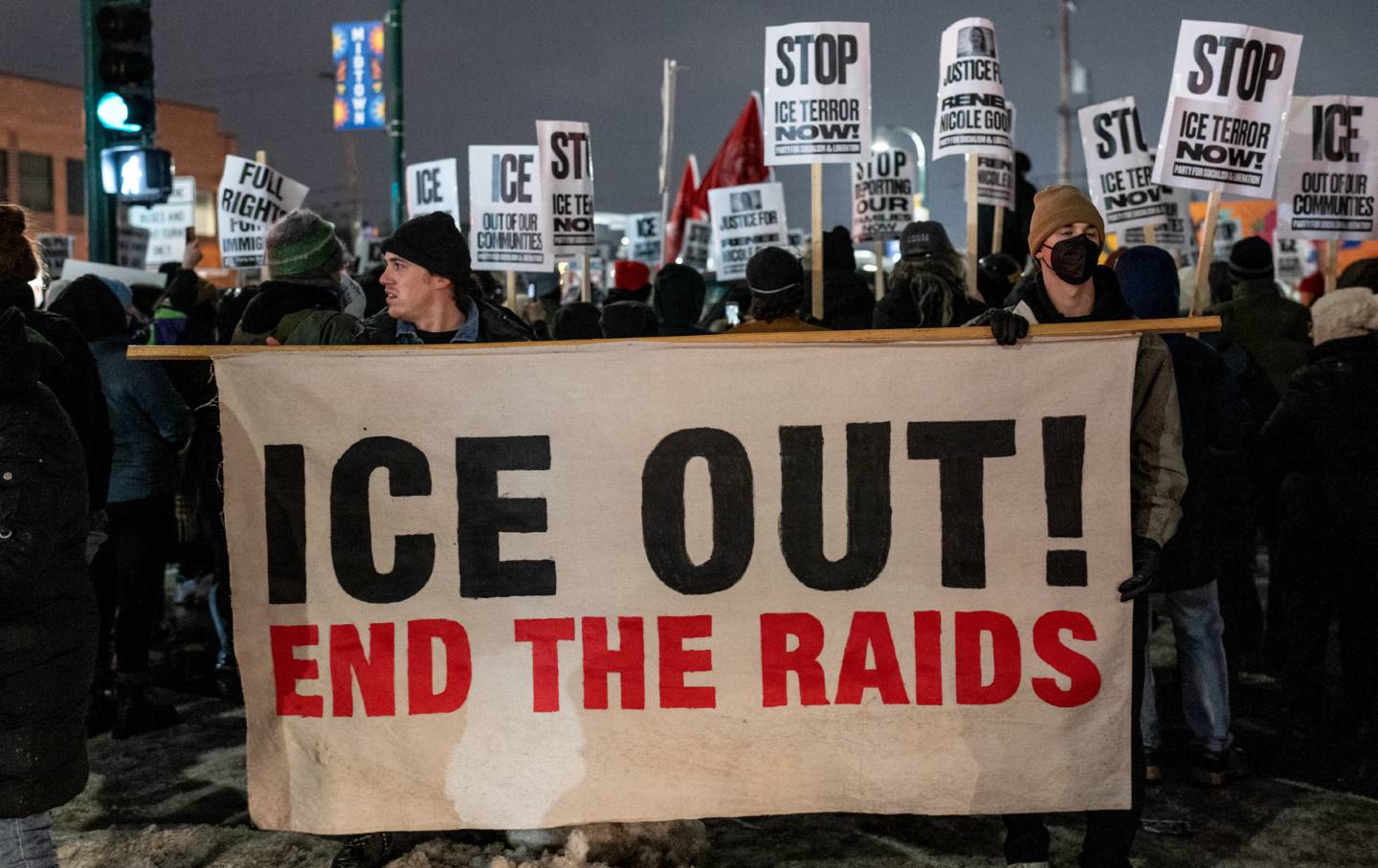
Abolish ICE or GTFO Abolish ICE or GTFO
In this week’s Elie v. US, The Nation’s justice correspondent makes the case to get rid of ICE, explores George Conway’s congressional campaign—and shares his New Year’s resolutio...
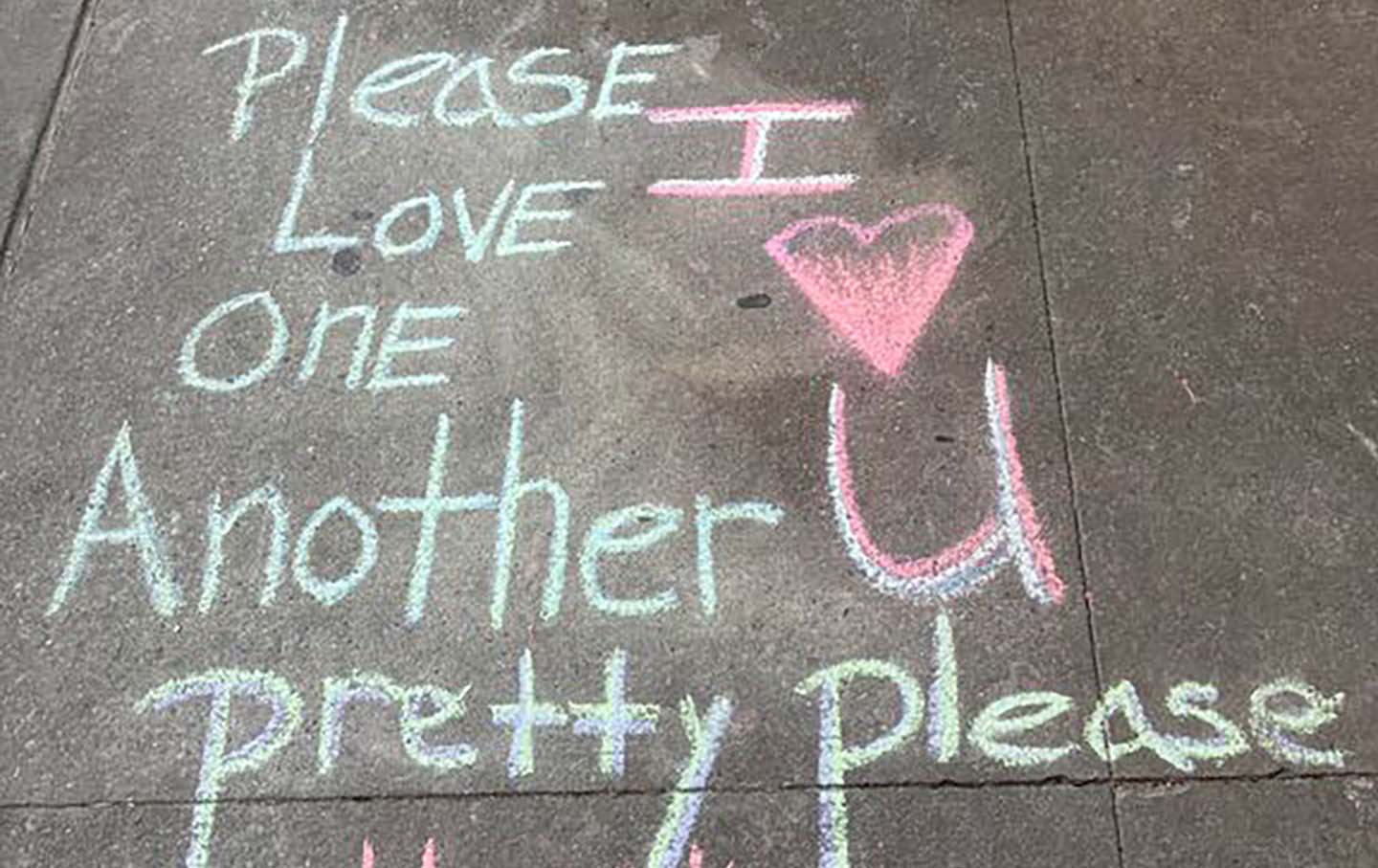
Pretty Please Pretty Please
Graffiti near Union Square, New York City.
OppArt / Anonymous and Peter Kuper
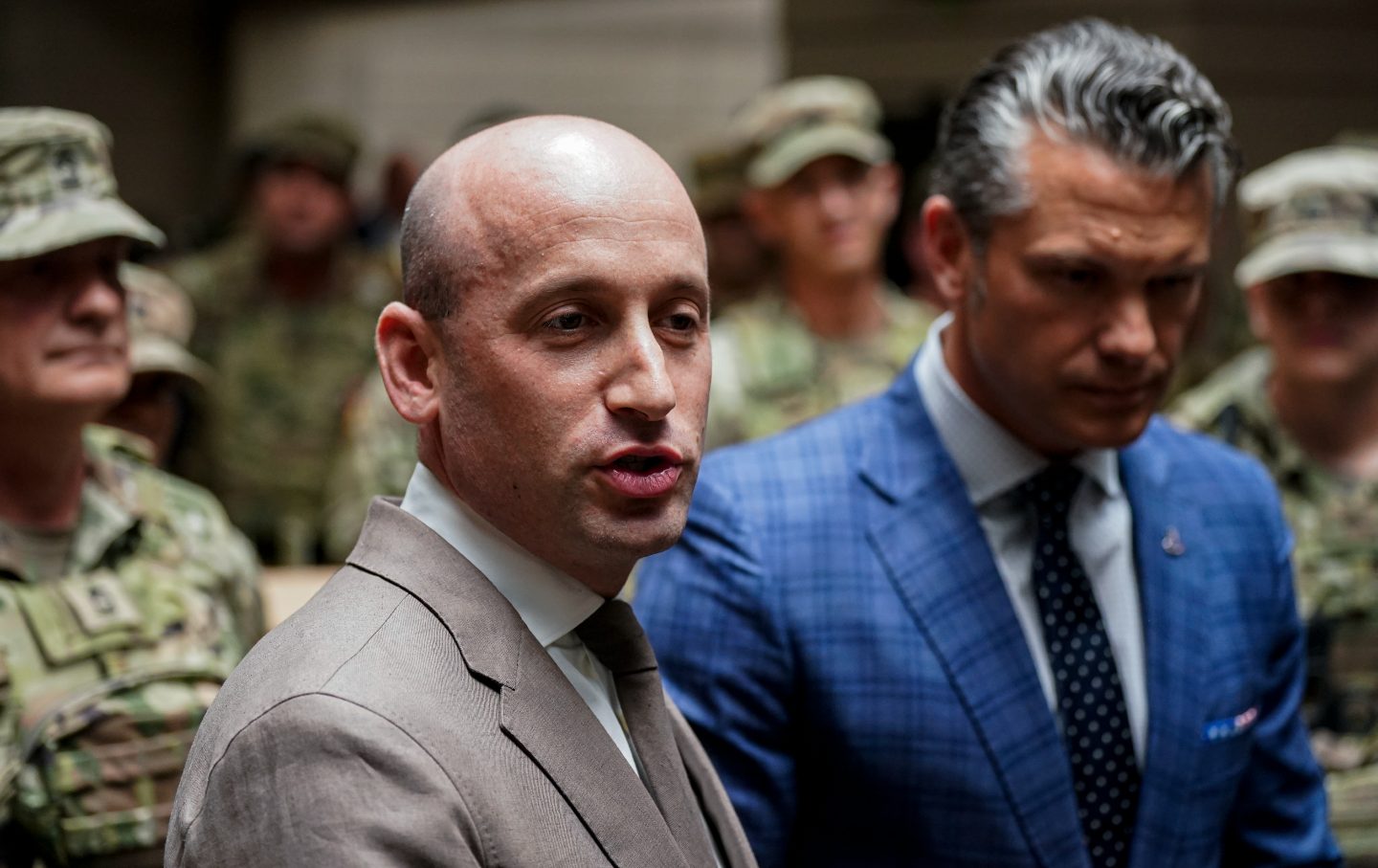
The Ugly Beast of American Authoritarianism The Ugly Beast of American Authoritarianism
Might is right is the philosophy behind the Trump administration’s decision to kidnap Nicolás Maduro.
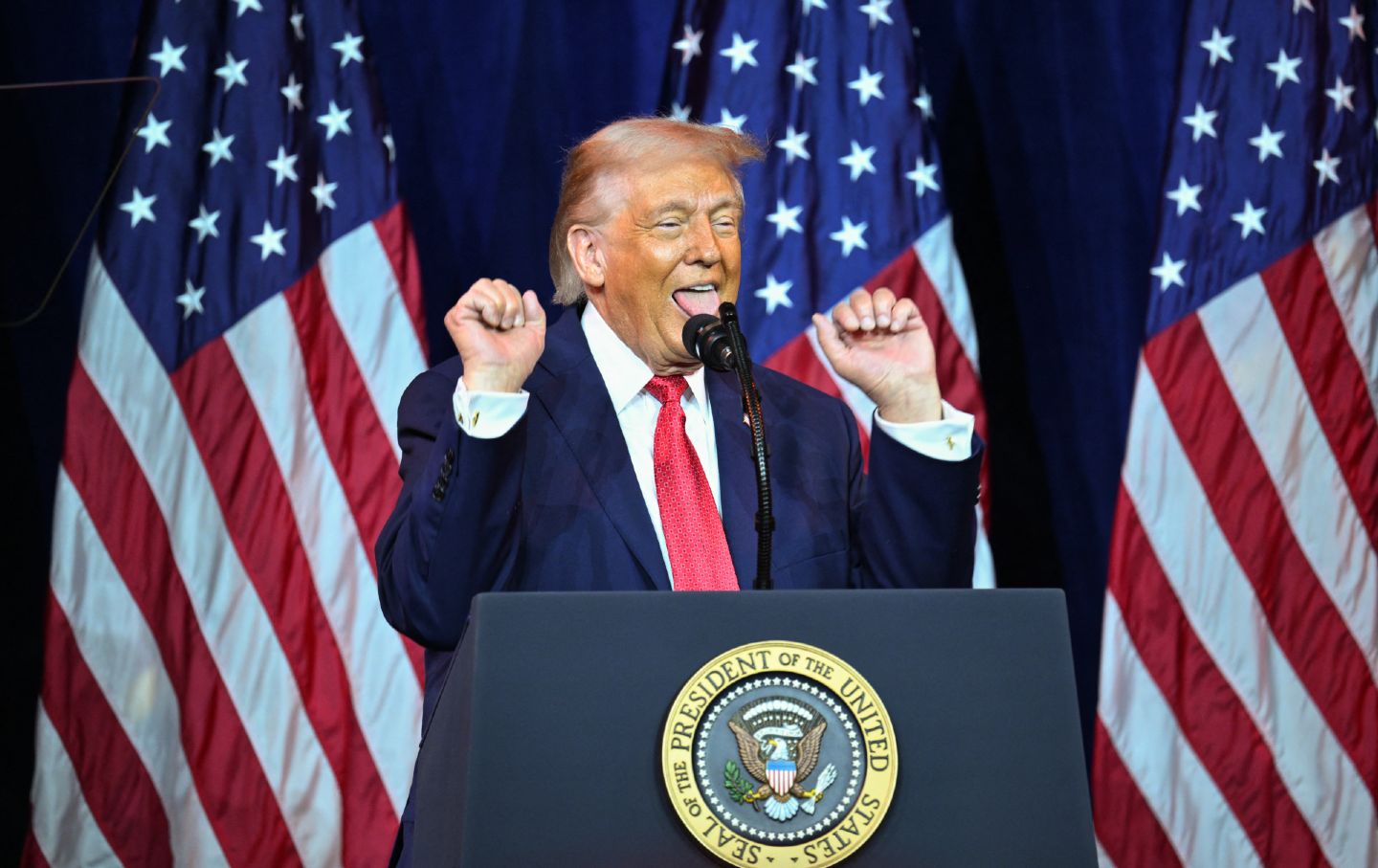

Jews for a Free Palestine Jews for a Free Palestine
Being anti-genocide isn’t antisemitic.

